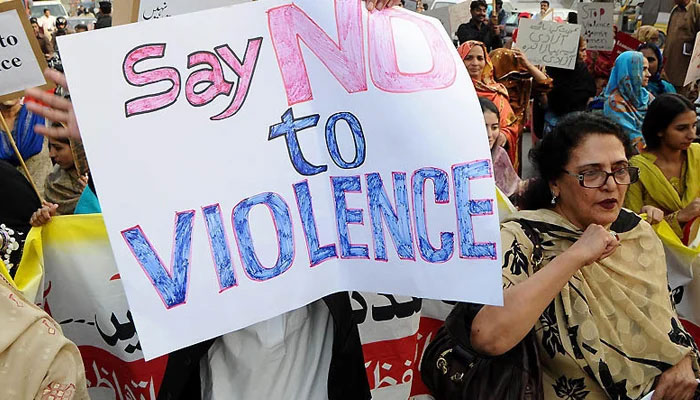Cost of silence
Sialkot murder case, where a pregnant woman was killed by her in-laws, reveals depths of human cruelty
How far can hatred drive a person? The recent Sialkot murder case, where a 30-year-old pregnant woman was brutally killed by her in-laws, reveals the depths of human cruelty. This young woman, a mother to a two-year-old, was murdered over a petty domestic dispute. But that’s not just it – horrifically, her dismembered body was stuffed in a sack and discarded. According to the victim’s father, her crime was going abroad with her husband– something her in-laws could not tolerate. This horrific crime forces us to confront an unsettling question: how did we reach a point where such brutality is conceivable? Women constitute half of Pakistan’s population, yet their struggles are often minimised or outright ignored. The patriarchal narrative forces women to suffer silently, binding their ‘honour’ to their capacity for endurance. When women muster the courage to speak out, their voices are drowned by those who benefit from deeply entrenched patriarchy. When they march to demand their rights, they face ridicule and gaslighting, with critics pointing to an imagined list of ‘privileges’ women allegedly enjoy.
Domestic violence cases should prompt urgent action from policymakers to strengthen legal protections and ensure perpetrators face justice. Yet, time and again, reports of such tragedies emerge with chilling regularity. The names and faces change, but the crimes and circumstances remain eerily consistent. Families of victims are often coerced into ‘forgiving’ the perpetrators for the sake of societal harmony, perpetuating a vicious cycle of violence and impunity. How long will we tolerate this systemic injustice? While the government has established helplines and safe centres for women, these efforts are insufficient. Women need safe spaces free from judgment, where they are not pressured to reconcile with their abusers. Take the case of Zara, the Sialkot victim. Her father revealed that her in-laws routinely tortured her, yet no meaningful action was taken. This failure underscores the urgent need for accessible, government-funded mechanisms to support victims of domestic abuse.
It is imperative to establish professional counseling clinics in every district and residential area, offering victims a chance to seek help without fear of stigma or reprisal. Additionally, stricter laws must be enforced to deter domestic violence, with no loopholes that allow perpetrators to escape accountability. These steps are not luxuries but necessities if we are to protect the lives of women and girls in Pakistan. The Sialkot case is a grim reminder of the failure of our institutions and society to safeguard the vulnerable. It is a stain on successive governments that have neglected to build a culture of safety and respect for women. We must reject the notion that domestic violence is a private matter and treat it as the public crisis it is. Strengthening family structures, dismantling harmful traditions, and fostering respect for women’s rights are critical to ensuring that no woman suffers the same fate as Zara. Only then can we hope to create homes that are truly safe for everyone.
-
 ‘Narcissist’ Andrew Still Feels ‘invincible’ After Exile
‘Narcissist’ Andrew Still Feels ‘invincible’ After Exile -
 Shamed Andrew ‘mental State’ Under Scrutiny Amid Difficult Time
Shamed Andrew ‘mental State’ Under Scrutiny Amid Difficult Time -
 Bad Bunny's Super Bowl Halftime Show: What Time Will He Perform Tonight?
Bad Bunny's Super Bowl Halftime Show: What Time Will He Perform Tonight? -
 Where Is Super Bowl 2026 Taking Place? Everything To Know About The NFL Showdown
Where Is Super Bowl 2026 Taking Place? Everything To Know About The NFL Showdown -
 Chris Pratt Explains Why He And Katherine Schwarzenegger Did Premarital Counseling
Chris Pratt Explains Why He And Katherine Schwarzenegger Did Premarital Counseling -
 Drake 'turns Down' Chance To Hit Back At Kendrick Lamar At Super Bowl
Drake 'turns Down' Chance To Hit Back At Kendrick Lamar At Super Bowl -
 Sarah Ferguson Had A ‘psychosexual Network’ With Jeffrey Epstein
Sarah Ferguson Had A ‘psychosexual Network’ With Jeffrey Epstein -
 Miranda Kerr Shares The One Wellness Practice She Does With Her Kids
Miranda Kerr Shares The One Wellness Practice She Does With Her Kids -
 Czech Republic Supports Social Media Ban For Under-15
Czech Republic Supports Social Media Ban For Under-15 -
 Khloe Kardashian Shares How She And Her Sisters Handle Money Between Themselves
Khloe Kardashian Shares How She And Her Sisters Handle Money Between Themselves -
 Prince William Ready To End 'shielding' Of ‘disgraced’ Andrew Amid Epstein Scandal
Prince William Ready To End 'shielding' Of ‘disgraced’ Andrew Amid Epstein Scandal -
 Chris Hemsworth Hailed By Halle Berry For Sweet Gesture
Chris Hemsworth Hailed By Halle Berry For Sweet Gesture -
 Blac Chyna Reveals Her New Approach To Love, Healing After Recent Heartbreak
Blac Chyna Reveals Her New Approach To Love, Healing After Recent Heartbreak -
 Royal Family's Approach To Deal With Andrew Finally Revealed
Royal Family's Approach To Deal With Andrew Finally Revealed -
 Super Bowl Weekend Deals Blow To 'Melania' Documentary's Box Office
Super Bowl Weekend Deals Blow To 'Melania' Documentary's Box Office -
 Meghan Markle Shares Glitzy Clips From Fifteen Percent Pledge Gala
Meghan Markle Shares Glitzy Clips From Fifteen Percent Pledge Gala




